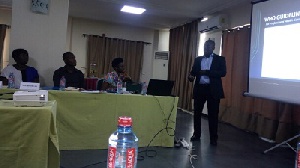Roche Products Ghana Limited (RPGL) in collaboration with Global Media Alliance, has organised a media academy training in Accra to equip journalists with skills in health reporting.
The Academy, which runs through a period of four months with four training schedules aims at training journalists in making health reporting a specialty; ethics in health reporting; and the need to consider the health interest of the public.
Mr Charles Fordjour, Head of Africa Policy and Governmental Affairs, RPGL said Roche is interested in organising the training because it wishes that Ghana becomes the right environment for innovation and production of medicines.
“We wish that Ghana would be a setting where journalism would have journalists with interest in specialising in health reporting,” he said.
Mr Akwasi Sarpong, Managing Director of Global Media Alliance asked media houses to be cautious of platforms given to health institutions to promote their products without finding out whether they are certified or not.
He said some of the medication is poisoning the system.
“We need to pay attention to the needs of the communities as well as issues that affect them”, he said.
He urged journalists to re-consider principles in the profession such as being accurate, fair and balanced, full attribution to sources, clear separation of reporting from analysis and opinion.
Dr Louisa Effah-Manu Preko, a medical practitioner at the Korle-Bu Teaching Hospital making presentation on an overview of health status in Ghana said: “We prefer to eat tin foods because we feel lazy to go through long processes in cooking our local dishes and that puts our health at risk.”
She said communicable diseases account for majority of deaths in Ghana with approximately 51 per cent.
Speaking about Hepatitis as a communicable disease, Dr Preko said viral diseases like Hepatitis B has a national prevalence of about 12.3 per cent.
She said according to the World Health Organisation, non communicable diseases such as cardiovascular diseases, cancers, chronic respiratory diseases, diabetes, mental disorders, vision and hearing impairment, oral health, bone and joint diseases and genetic disorders have a high economic burden on the country.
Dr Preko advised journalists to research and unearth whether national policies that exist in the country are being implemented and if structures being set to manage health matters are working effectively to achieve their mandate.
Health News of Wednesday, 6 April 2016
Source: GNA













